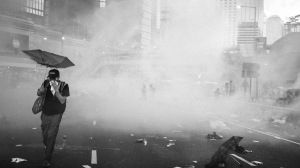
Since many the news networks have been nursing a serious case of Ebola obsession for the past month, there have been other major events around the world that have been downplayed, even muted. In Hong Kong, China, there have been major student-led protests demanding the resignation of the current Chief Executive of Hong Kong along with free and fair elections.
The protests have been coined the “Hong Kong Umbrella Revolution” by the media due to protesters’ use of umbrellas to protect themselves from tear gas. The young protesters are occupying Hong Kong’s chief business and financial center, questioning the voting system that limits voters to choose between candidates pre-approved by Beijing. The pro-democracy nature of the movement has put the Communist Party on edge, especially since the protests are reminiscent of the 1989 Tiananmen Square protests.
Hong Kong has only been a part of China since 1997 when the former British colony was returned in accordance with an agreement made 100 years before. At the time, Hong Kong was promised significant autonomy under a “one country, two systems” principle. Seventeen years later, however, the Communist Party of the People’s Republic of China is slowly threatening the freedom reserved for Hong Kong, igniting the current protests.
While the People’s Republic of China remains a nominally Communist country, elements of democracy have crept in with the increasing levels of capitalism, and many Chinese citizens are hungry for more. The Umbrella Revolution in Hong Kong epitomizes the current struggle for democracy slowly crawling through the PRC.
To me, the Umbrella Revolution is a microcosm perfect for gauging what is important to youth, not only in China but also across the globe. These student protesters are fighting for democracy and for human rights. They have grown up in the Digital Internet age, where they have encountered images of Western democracy. They are educated; they are familiar with movements of the past and believe in using peaceful protest and civil disobedience in order to make their voices heard. This is the new revolution; the youth are not interested in violently toppling regimes or planning coups, but in peaceably achieving freedom.
Though these protests are taking place half a world away, they are still relevant to us as Americans and as students. The Umbrella Revolution embodies many of the issues at the forefront of our society. As the movement faces police brutality, censorship, and fights for democracy, so do we.
The issue of police brutality against the protesters in Beijing is not unfamiliar to us. We may look at the tear-gassing of peaceful protesters as just another example of run-of-the-mill “Commie evil,” but at the same time, we are facing similar issues of police brutality right here in America: just look at the current situation in Ferguson, Missouri.
In addition, the censorship of the protests in the Chinese media is not a problem specific to the People’s Republic of China. During the most volatile moments of the protests, China blocked Instagram and interrupted newscasts to prevent mainland China from viewing coverage of the protests. The censorship exercised by Beijing is not exclusive to China; we are also fighting censorship. Yes, even in America, the country famously protected by the First Amendment, censorship is not dead. While our issues with censorship currently concern net neutrality and not the cover-up of anti-government protests, censorship is still a prevalent issue in the United States.
As such, an examination of the Umbrella Revolution can illuminate many of our own concerns, both domestic and international. The current protests in Hong Kong provide a figurative thermometer for the state of the world and of the issues important to today’s youth.
